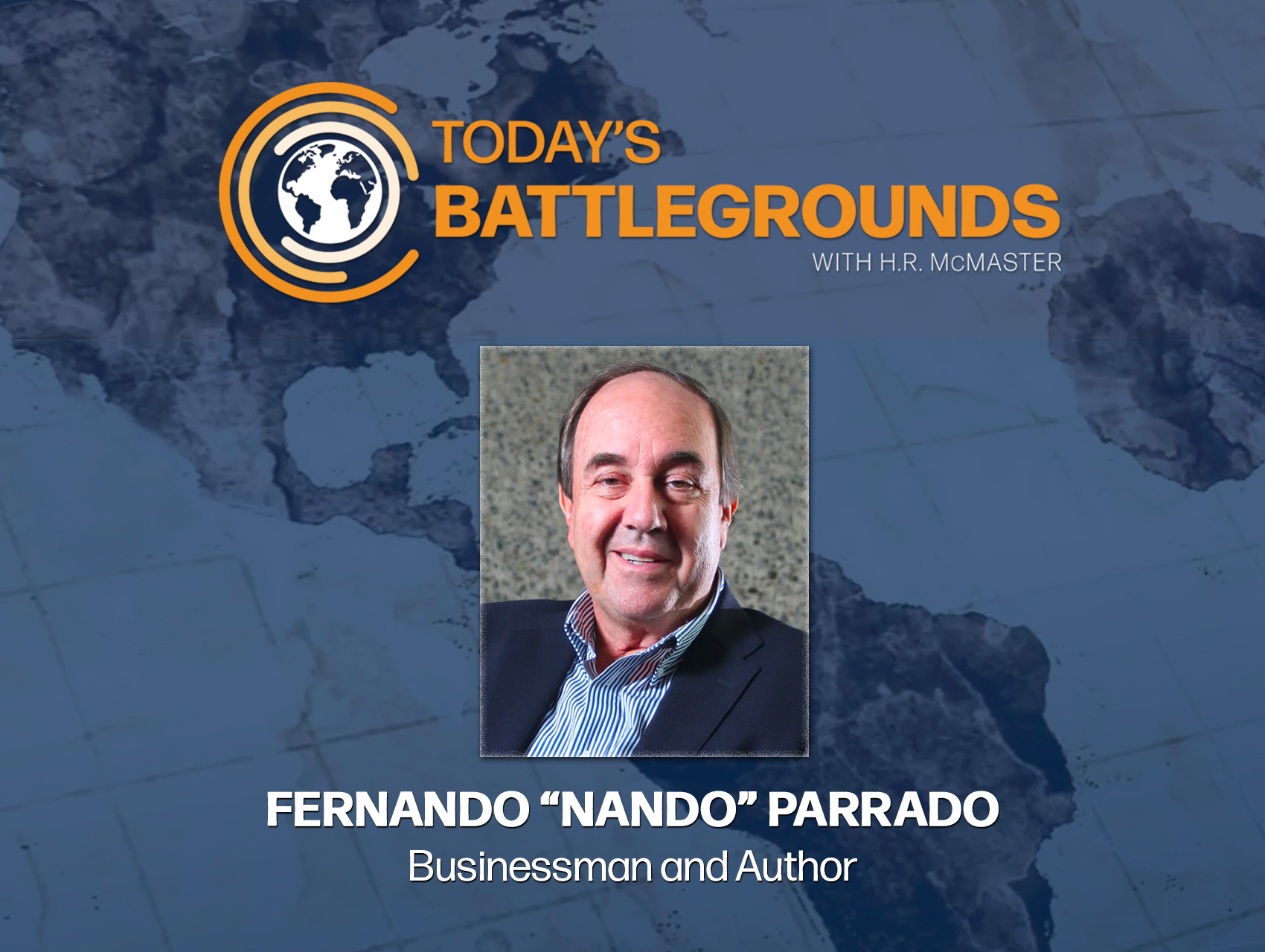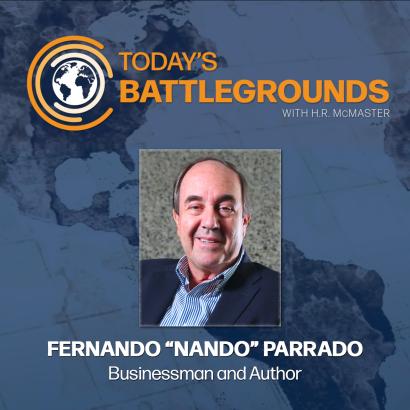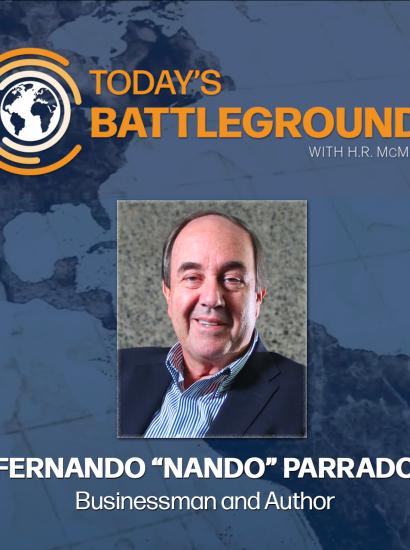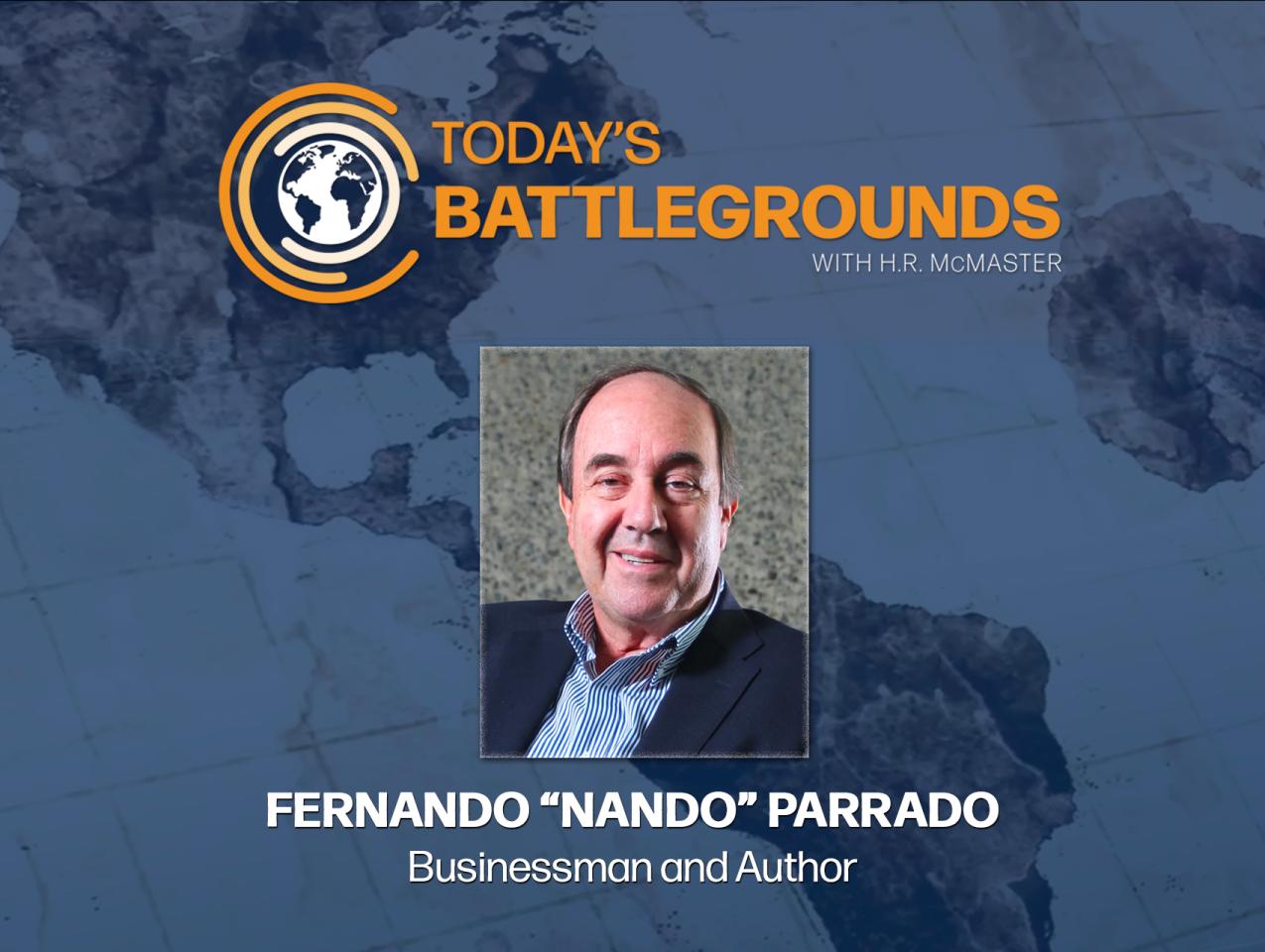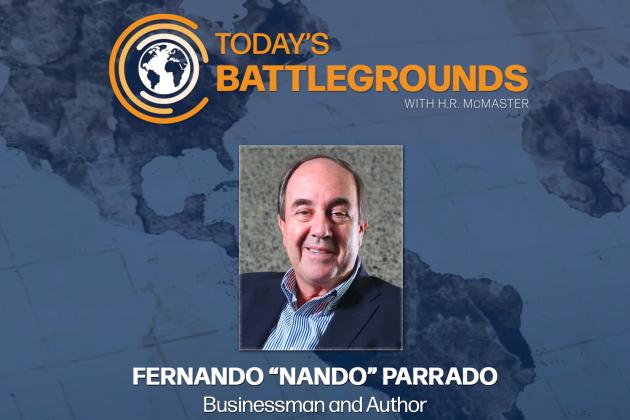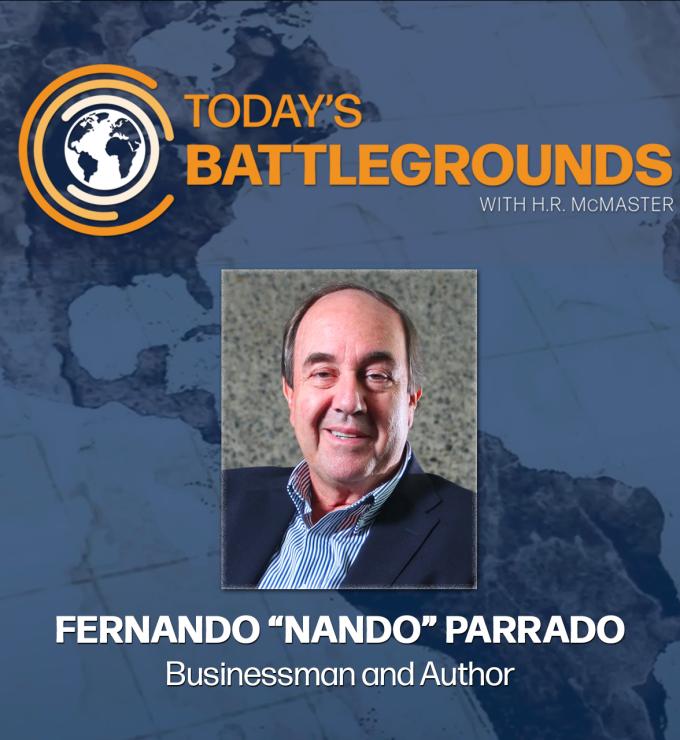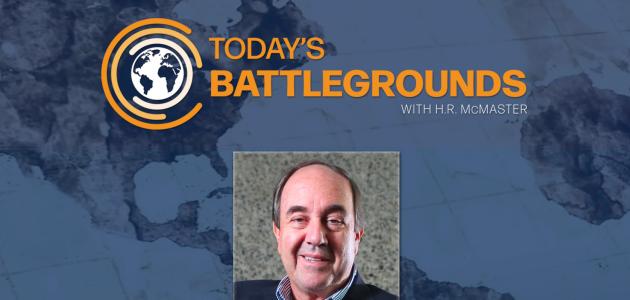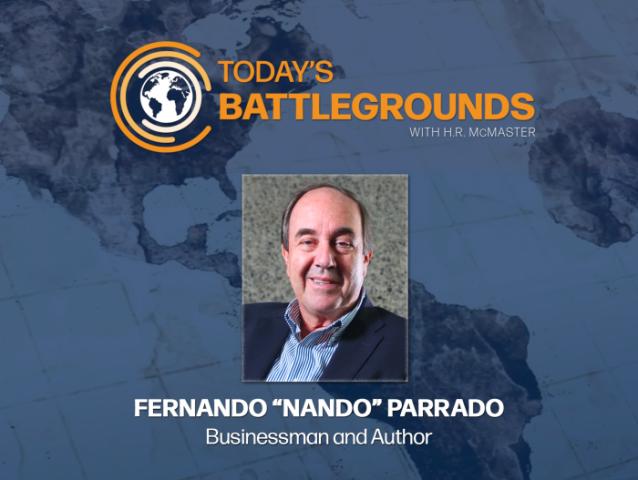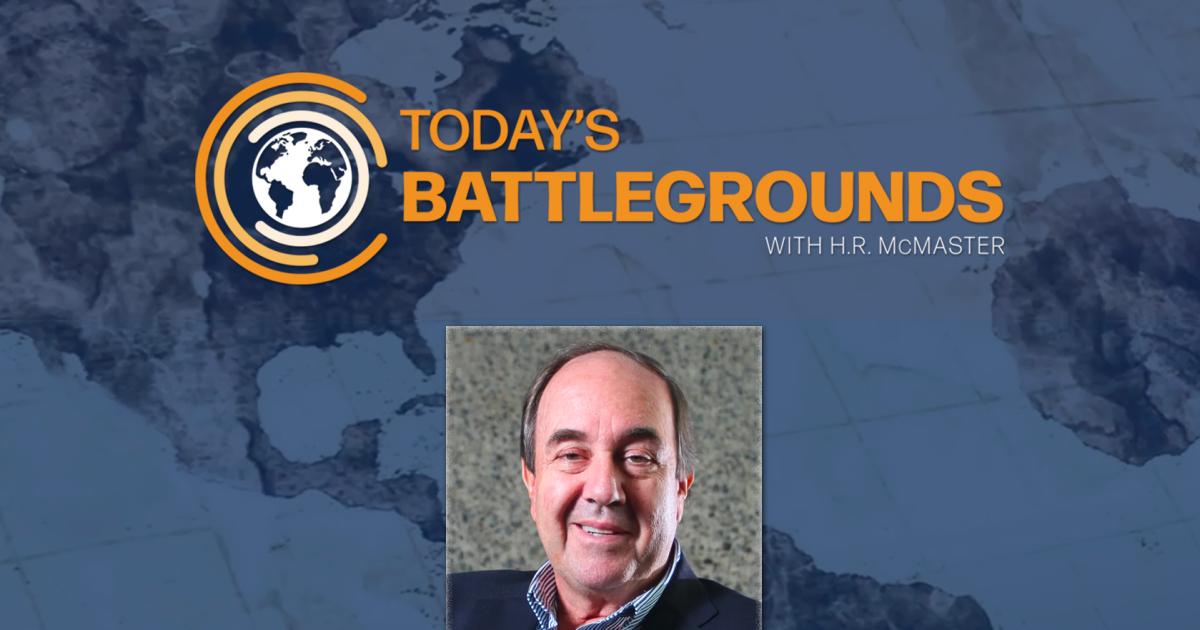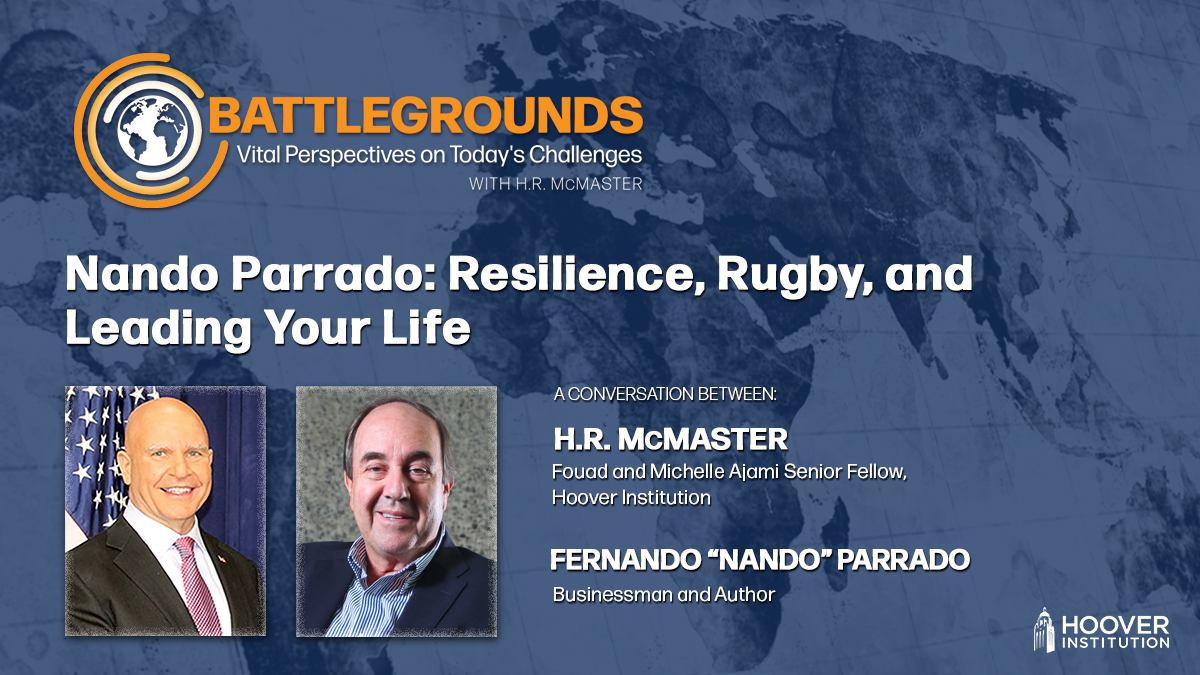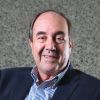
- History
Join Fernando “Nando” Parrado, businessman, author, and internationally recognized speaker, and Hoover Senior Fellow H.R. McMaster as they discuss endurance, crisis leadership, and the remarkable will to survive. Surviving one of the most harrowing events of the twentieth century: the 1972 crash of Uruguayan Air Force Flight 571, tragically losing his mother, sister, and many rugby teammates, Parrado reflects on how the values and work ethic his family engrained in him, which was nurtured on the rugby pitch, helped build the resilience needed to withstand 72 days in extreme conditions and lead a mission across the Andes to save the remaining survivors. Author of international best-seller, Miracle in the Andes, Parrado describes why he chose to publish the book 36 years after the ordeal, how he went on to create a second life after the trauma, why rugby instills life lessons like no other sport in the world – moral clarity, collective responsibility, self-confidence, and his inspiring advice for young people today.
LISTEN THE PODCAST
>> H.R. McMaster: America and other free and open societies face crucial challenges and opportunities abroad that affect security and prosperity at home. This is a series of conversations with guests who bring a deep understanding of today's battlegrounds and creative ideas about how to compete, overcome challenges, capitalize on opportunities, and secure a better future. I am H.R. McMaster. This is Battlegrounds.
>> Narrator: On today's episode of Battlegrounds, our focus is on endurance, leadership, and the remarkable will to survive. Our guest, Nando Parrado, is a businessman, author, and internationally recognized speaker whose extraordinary life story began with one of the most harrowing survival events of the 20th century, the 1972 crash of Uruguayan Air Force Flight 571 in the Andes Mountains.
At just 22 years old, Nando Parrado was a university student and rugby player traveling with his team, the Old Christians of Montevideo, to Chile for an international match when their plane crashed into the snowbound Cordillera de los Andes at an altitude of 18,000ft. Twelve of the 45 passengers died on impact.
Parrado remained unconscious for three days before he woke to discover that the crash had killed many of his teammates, his mother, and fatally injured his sister. Trapped at high altitude, facing sub-zero temperatures, avalanches, and starvation, the surviving team members were forced to make unimaginable decisions. The Andes, which stretch 5,500 miles along South America's western edge, are a formidable terrain of towering peaks and high plateaus.
Parrado and the 15 survivors endured extreme conditions for 72 days, and ultimately Parrado led the mission to find help alongside teammate Roberto Canessa. He trekked for 10 days across the snowy Andes and eventually encountered herdsmen near Los Maintenance, Chile, on the opposite side of a river too loud to communicate across; they and the herdsmen threw rocks with notes wrapped around them, resulting in the rescue of Perraro, Canessa, and all other remaining survivors.
Parrado has since authored the international bestseller Miracle in the Andes Personal Reflection on the Ordeal and served as an advisor on multiple film and documentary projects about the event, including Alive, released in 1993, I Am Alive, released in 2010, and the critically acclaimed Netflix film La Sociedad de la Nieve Society of the Snow, released in late 2023.
The film has received widespread acclaim and was nominated for an Academy Award for Best International Feature Film. Parrado credits the culture of rugby with shaping the unity, discipline and perseverance that enabled the team to enjoy their ordeal. He emphasizes that rugby instills a powerful sense of collective responsibility and moral clarity, qualities that prove vital in moments of extreme adversity we welcome Nando Parrado to discuss his legacy of survival, the ethics of crisis leadership, and how the enduring spirit of teamwork nurtured on the rugby pitch carried him and his friends through one of the greatest survival challenges in modern history.
>> H.R. McMaster: Nando Parrado, welcome to Battlegrounds. It is a pleasure to welcome onto this show a great rugger and a person who can give us, I think, tremendous insights into life, perseverance and resilience. Thank you so much for joining me.
>> Fernando Nando Parrado: Thank you, HR for me, it's an honor.
I mean, I've heard a lot about you. You're a rugby player and anybody who has been on a rugby field for some time and playing rugby with a team knows that any rugby player in the world is a brother. You know, it doesn't happen with any other sport.
Okay, and my name is Nando Parrado. I live in Montevideo, Uruguay. I'm here in Montevideo now and I'm 76 years old. I have been businessman, entrepreneur, whatever you can call it. I have been always the, the owner of my life with all the positive things and the bad things in those things, because you have to achieve.
If you don't achieve, you don't pay, for food, for your family, lodging dressing, healthcare, schooling, college, everything. So during the pandemic, I sold three of my companies. I only have one now, a television production company. And I have plenty of life now to enjoy my, my life with my family first, my friends, my sports and my dogs.
>> H.R. McMaster: Well, now you introduce the themes I want to talk to you about, the first is a theme of kind of community and how important it is for people to be part of a family and a broader community. Nando, I think we are better connected to one another than ever, electronically.
But it seems like we're more distant from one another than ever, socially and psychologically and spiritually and emotionally. And so could you talk about the importance of team to you? And I want to read, I want to read just a short passage from, you know, from Miracle in the Andes, which I recommend to anybody, everybody, in terms of the life lessons.
But you wrote your effort, you're talking about a rugby team now. Your effort and your will vanishes into the collective will of the team and if this will is unified and focused, the team surges forward and the scrum magically begins to move. To me, this is the essence of rugby.
No other sport gives you such an intense sense of selflessness and unified purpose. And I'll tell you I confess to you that I was a wing but I played wing like a wing forward so I, I understand the scrum and love the weak side game with my loose forwards and so could you talk to me about and us about that what you learned from rugby in terms of the importance of community and really family.
>> Fernando Nando Parrado: It's very, very strange to speak about rugby. Sometimes people don't know what rugby is in certain parts of the world. I have played soccer, I played tennis, I did a lot of motor racing in bikes and cars and everything but I have never felt the feeling that I had on a rugby team.
You know, now it's changing a little bit. But not any single team rugby team in the world had the name of the player on the back ever. Only a number right? In rugby there are no stars. Everybody. The 15 players on the team is a fundamental piece of that team.
Everything has to work together in other teams. In basketball, NFL, you have stars that the team plays for, those stars. In rugby, there is no star, everybody has the same importance. And it's a very tough game in a way, you don't wear any protection whatsoever. Just, you know, a T shirt sometimes or, or a shirt.
And you have to protect your opponent, you have to protect yourself, and your team protects you. And I've never found that on any other sport. On any other sport. And the beautiful thing about rugby is that after a game which is very strong, even if it's your last Sunday here was the final of the Uruguayan Rugby championship and it's a very strong game, very strong game.
But after the game, even if it's a lot of friction, there's some blood coming out of some place. There's a third game, which is called the Tarsar Tiempio. After the game, everybody embraces each other, salutes each other, and they have a beer together.
>> H.R. McMaster: You have a party together.
Exactly. Yeah.
>> Fernando Nando Parrado: Yeah, Partying together.
>> H.R. McMaster: So you sing and we, and you sing together.
>> Fernando Nando Parrado: We sing together. And that friendship. I started playing rugby in school, then in high school, then on the National League. And my friends who started playing rugby with me in my school when I was 10 years old, 11 years old, are my dear friends today.
We get together every month we get together. And that friendship has been. Has had roots in rugby. Plus, I always say I had hardships in my life. I had very difficult things in my life. And rugby saved my life, rugby saved my life. And probably we'll talk a little bit about that later, because we'll talk about this plane crash in the Andes where I was a team member of a rugby team.
And hadn't it been, and this is very, very personal to say, but hadn't it been a rugby team, it would have been very difficult to survive over there. Very, very difficult to survive.
>> H.R. McMaster: Nando When I read your story, I think a lot about the army where I served.
I served in the army for 34 years. And, one of the things you do is you. You focus on building teams, teams that are bound together by mutual trust, common purpose, and real affection. A good army unit becomes like a family. And what really what you're doing is you're building up, you're building up those bonds of mutual confidence, trust in one another, affection for one another.
That steals you against fear. And the other debilitating emotions that you can experience in battle, right? Especially when you lose loved ones and you're stressed in a difficult situation. And when I read your book, I thought that this is a lot like combat. You went into combat very suddenly.
And I wonder if you could share with our viewers now, as you look back on it, and you didn't write the book for many years, I mean, decades. You haven't given an interview for, I think, three years. I think when I read the book, it seemed to me like you were explaining, you were explaining how you were able to come through this.
Can you share with our viewers what built up in you and your teammates and those who experienced this horror, that kind of resilience, that strength to endure?
>> Fernando Nando Parrado: Well, let me see. I listen to you and I'm making some parallelism between what you say and what we suffered over there.
We had a great war, a great battle every single day, a great battle against nature and nature has patience. It never gets tired. It defeats you with time. It never, they have the mountains, the snow, the ice. They have been there for millions of years. And we were dropped into that environment without any knowledge, without anything.
We were at that time, the average age was 19 years old 19, almost 20, 19. And three quarters of the team over there, but we came from the beach, from the sea. We had never seen mountains, snow or ice in our lives. And we were dropped there. So the team, the regiment, the platoon had to get together and we started this war almost immediately.
We crashed with an airplane. I don't know if people who are listening to this, maybe they know the story, they have seen the movie, the Society of the Snow or whatever. But we were dropped into the worst place where a human being can survive. You can survive on the desert, on the jungle, on the ocean, with no chances, on the highest peaks in South America or the Himalaya.
You cannot survive there. But 15 minutes after the plane crash, we had a leader, the captain of the rugby team. He was already leading, organizing everything, doing whatever he had to do. It didn't matter if it was strong or not. He had to take dead bodies, take care of some of the guys that were badly wounded.
And he never had any instruction, any survival training, whatever. He was a rugby captain and we stayed. All the survival experts say that we couldn't have survived more than 36 hours in that environment. And we survived for two and a half months were on the plane, there were members of our club who were not rugby players.
But there were 17 rugby players of the first division, my team, my rugby team over there. Of the 17 players, 12 died. Along the 72 days, 12 died. It's a battle. It's a action, you're in action. I know you have been with machine guns firing at you, whatever.
This is a battle against nature. And you have to react and you have to believe on that bond that was created on the field, a rugby field. Of the 17 players, 12 died. But the other five rugby players were the ones who did everything to help the other ones.
Why, because we were rugby players. We believed into each other. And I just remember one, one night, we were out on an expedition to. Find the tail of the plane. But we were caught on a storm, on a huge storm. And I want to relate that to the middle of a great battle that you have been in, the soldiers are battling, the bullets are coming from all over and people are getting killed.
And only if you have been there, you can relate to that, but if there's one of your platoon or your regiment wounded over there, and you say, I have to get him, I have to help him, how do you do that? You never think, you never realize the danger you're going into, but you run, you pick him up, and you bring him into behind a wall or whatever because he was wounded and he was part of your regiment here.
One of my teammates falls down, gave up in the middle of a storm. You are inside a ping pong ball, everything is white. The wind, everything, the sound and you, I went back and picked him up. Why? I don't know why, but how many things could be so much in common with what you lived?
True.
>> H.R. McMaster: Yeah, Nando, your story resonates so much with me. There's so much of even training in our military, but, but especially in combat, actually, your responsibility for others, leadership responsibility, I think, insulates you from fear and the debilitating effect of that emotion because your responsibility makes you think about others more than yourself.
And then also, you just, you have this sense of honor, like you don't want to let other people down, and you actually fear that more than you fear in your case the harshest elements you can imagine, right? An environment you can imagine or any bullet that might be heading in your direction.
So, I really, it really resonated with me your whole story. And, I wanted to ask you, now that you look back on it, you look at that strength on that expedition to go find the tail of the airplane and other times when it was a setback, like the avalanche, I'm thinking, can you maybe share with our viewers what in your life?
I mean, obviously the, the teamwork, the bonds that you have with your rugby teammates. But, but what helped prepare you for these trials and what helped develop in you the kind of resilience that you and your teammates displayed.
>> Fernando Nando Parrado: In my life in my case, I've always looked back and everything that my parents and my Grandparents taught me.
My mother came from Ukraine to Uruguay when she was 17. She never spoke a word of Spanish or everything. They just ran away from the war, with my grandmother, also Ukrainian, and two of my mother's brothers.
>> H.R. McMaster: She ran away. We should tell our viewers from probably the holomador.
>> Fernando Nando Parrado: She ran away because nobody thinks about Ukraine and Poland in those days. But it was awful. They couldn't, they didn't even have food to eat, so they could run away.
>> H.R. McMaster: They were deliberately starved by Stalin.
>> Fernando Nando Parrado: They were deliberately starved by Stalin, luckily they found a ship that was coming to South America and they never knew where they were going, but they stopped here.
So life goes on and she started working very low as a maid on a company. She was a maid and, but also answering the phone. She was, an all purpose person on this small company over there. And she started learning Spanish. One day she met another worker on the neighborhood who was my father.
They got, they fell in love, they got married. And my father was working with leather goods, creating belts and very, very, very poor family. But they started working together. And 30 years later, they were. My father was one of the biggest entrepreneurs and importers of construction equipment and fastening systems in the country.
You know, working. So what did I see? I saw that, I saw that. I saw the way they loved each other, the way they worked together without any. They worked 24 hours a day. I mean, it's not like now where I see workers, I say, okay, I want to work only six hours a day and how much are you going to pay me and how much holidays do I have?
So I, I was bred into that. I learned that, I saw them working. They taught me with example, not with words and commandments and dogmas. You know, I saw what they did and they were, they were very much in love. And they worked so hard to send us to the best school so that we could learn what they never learned.
So my responsibility to them and the way they fought, I think was engraved in my back. So when I had to fight and I had to look for myself on a very difficult environment, I remember that the base that my family created at my home, which I today, I think it's the same thing.
Today is the same thing, the family is, the base, is the foundation of everything. The family of any religion, but it has to be a family, you know.
>> H.R. McMaster: Yeah.
>> Fernando Nando Parrado: And I came from there. They sent me to a very good school, very good school, which was very.
>> H.R. McMaster: Though I love this story, by the way. Please share. Like your, the story of your education and how that built resilience. I went to Catholic grade school and a military high school, and so I, connected with that part of that, that story in the book.
>> Fernando Nando Parrado: Yeah, we, we were educated by the Irish brothers, the Christian brothers from Ireland.
They had a school here in Monay, and they were very fond of rugby. So the school sport was rugby. So the technical director was obviously always a brother who played rugby in Ireland. So they taught us to play and they were like a tough school. But I look back and I enjoy and with my friends, we say what a great school we have.
What a great school. Because they taught us to be, to find our character. Because character is not taught. You find your character in life. Some people find it before other ones but you find it. They taught us to lead our own lives. Why? Because if you don't lead, if you are a loser in your life, in everything, how can you lead other ones?
How can you have a life? They taught us to believe in ourselves, they told us, wake up to the miracle that you're alive. You are the leader of your life, so they embedded that in our minds, through the years that we spent on the school. And I think it was a very, very good thing when the time came to really show our character, we had that background, I think it was like a military training.
I love it, is a lot like it, what of my old Ranger instructors when I was in Ranger school, where they create really hardships for you that you have to get through. And then you realize, as you've described, I mean, really, in a much more difficult and harrowing conditions, that you can accomplish so much more as a team.
As a community, than you can as an individual, no individual could ever have survived, I think what you survived and what comes through in your story is this sense of community. And I think that these brothers, these christian brothers, I think it's still that in you. Like the way my Ranger instructor instilled it in me when he said, how can you lead your man if you can't lead yourself?
And so you have this sense of how individual strength is important, but also the strength of the community. Or I can see now and compare and what we did in the Andes over there, which we were a real community, real rugby in the hardships of survival. But nobody wanted to be the leader of that group,everybody was the leader of his life over there, everybody knew what to do.
Who wanted to be the leader of a group of guys condemned to die, we trusted each other. People say what saved you? Trust in the other guys, trust in the other guys, everybody knew what to do, whatever he had to do, trust him. And imagine that our captain, he had never seen snow in his life or whatever, but he took decisions that saved our lives, especially at the beginning, because you can imagine the trauma that you have.
In comprehension of what happened, half an hour, 15 minutes, 20 minutes, one hour after a huge plane crash in the middle of the mountains, you're lost. But this guy Marcelo, he started to take decisions that saved our lives two and a half months later. So I say, how could that have happened on a commercial airliner where nobody knows each other?
Different ages, different religions, different languages, different education, people traveling alone, people traveling with their families, how can you find a leader? And the decisions that Marcelo took on the first two, three hours of this crash saved our lives. So, and that's because he was a lion playing rugby and a fantastic captain.
>> H.R. McMaster: Nando, I think these are such important lessons for society broadly, I mean, we are in a situation these days, I think, where people are disconnected from one another. And the point that you just made about if this had been a civilian airliner where people didn't know each other, didn't have those bonds of, of trust and really affection for one another, you might not have been able to persevere.
I want to ask you a personal question, I'm sure our viewers will know from the story that your mother and your sister were on that plane and you lost them in the crash. And then in the days after, in the case of your sister, could you share maybe with them, how you coped with that hardship, the most unimaginable circumstances where you lose loved ones in this harrowing experience?
>> Fernando Nando Parrado: I never thought I would be on that position in my life, I never thought I would have a plane crash. I never thought I would have to bury my mother, my sister, my two best friends with my own hands in the middle of nowhere on the snow.
And for many years I looked back and I said, Nando, how did you do that? What happened to you? How were you able to do that? What happened? Because as soon as I buried them and I couldn't cry, and I said, Nando, why don't you cry? Why don't you have any feeling?
I had feelings, but I couldn't cry. Because when you're in the middle of the battle, in the middle of the machine guns and the grenades and whatever, and there is snipers that are hitting you just concentrate. And decades later, I spoke with some people that were very well trained in military, and they told me, look, Nando, when things happen, your mind goes into the most important thing.
On a limited situation of that magnitude, it like being in the middle of a battle, in the middle of a battle, in the middle, if you're an Air Force, US Air Force pilot fighting against three planes, I mean, you have to concentrate. And your mind, not you, your mind leaves behind whatever troubles you to focus on what you have to do.
Some people can do it, some cannot do it, and they die. Why you did it, it's because you were one of the ones who wanted to leave. When you panic in the middle of a battle or you're fighting on a nerve force, playing against three MIGs, if you panic, you're done.
And your mind protects you, your mind protects you from suffering in that moment, and then I looked at some stories. I remember the Boston Marathon explosion, when the bomb exploded, and you look at the moment the bomb explodes, most of the people run away from the explosion, but at the same time, there are three or four guys who run towards the explosion.
What makes the difference?, they run to help instantly, the other ones run away, so those are the moments, I think you find your character. And I remember my family, my friends, with a lot of love, but I don't suffer anymore.
>> H.R. McMaster: I want to talk more about that, One of my old lieutenants, Nando, he a fantastic guy, John Maguire, he was in New York, in a building in Manhattan when 911 happened, and what happened is.
He ran to the towers as they were collapsing. And there's a photo of him carrying out the chaplain from the fire department, from the rubble who had been killed by falling debris and everything. But that was his instinct, his instinct was to run toward, right the danger. And, of course, that's your instinct, you're a rugby player.
The Christian brothers, but also I would like to talk about the example of your father. And you started to mention, kind of the difficult, I mean, obviously you have a lot of difficult memories. And anybody who's been through trauma, they realize they have to cope with those memories and deal with them for the rest of their lives.
Can you talk about the example of your father and maybe how his example helped you cope with the trauma that you experienced?
>> Fernando Nando Parrado: I have to be very honest with you, maybe I'm a strange guy or whatever. I was never traumatized by this experience, I accepted it, I accepted it as it happened, and I said, okay, now let's move forward.
But the story of my father comes here, why?, you can imagine that I suffered a lot over there. I coped with a lot of things, but my father also, he was watching the television one night and he sees, plane crash in the Andes, the plane bla, bla, bla with a rugby team, and my family was there.
He knew about the plane crash, watching the TV, a news program, so the following two and a half months for him were hell. Imagine somebody who has a family losing three quarters of your family in one second, but as I told you, he came back from almost nothing.
When he was young, he married my mother, so he knew about fighting in life and he told me that during those two and a half months, he had a very bad time, very bad time. He couldn't work, he couldn't concentrate, he woke up at night, walked for hours, he slept with my dog in my bed.
And when I came back, he said, okay, Nando, thanks for resurrecting, because I came back from the dead. When people die, usually they take him, take them on a coffin, they put them on a graveyard, and they never come back, I came back, I resurrected and he embraced me.
We spent some time together, a couple of days together, just enjoying this resurrection. But, at one moment, he put his arms around me and he said, Nando, we can not modify the past, there's no way. We cannot modify the past, but let's not lose the second part of our only life.
My father, he told me that.
>> H.R. McMaster: And let's just for our viewers, I just want to say that again, let's not lose the second part of our only life, I mean, I think that is so profound, Nando.
>> Fernando Nando Parrado: It's so simple, my father, he went to fifth grade on a public school that he had to work.
But he was a guy, very pragmatic, with a lot of common sense and a fantastic worker. He worked 28 hours per day, I can assure you, but a great common sense and he said, let's not look back, let's not forget, and he told me people suffer as much as they want.
People suffer all their lives, looking back sometimes, when you understand that there's no way you can modify that past you understand life. Let's love them, let's not forget them, but let's look forward.
>> H.R. McMaster: Could you share with our viewers when you returned to the site of the crash with your father.
And what he told you about remembering, really, but not allowing.
>> Fernando Nando Parrado: My father obviously never forgot, not for one minute, but I mean, he went forward, but he was the first one. And one year after the plane crash, at 4,500 meters, the bodies of the people who didn't survive were buried there.
And my father said, Nando, I want to go up there, I want to go up there and put flowers in a grave of Mamá Susie and your friends. And I said, okay, I'll go with you, so we made an expedition, horseback, with the guides and everything, took us four days to get there.
And my father put flowers in the grave of my mother and my sister and my friends. One more important thing, he did it for 18 years in a row afterwards, 18 years in a row afterwards, that's love. And he said, Nando, I'm not crazy, I simply love and love your mother very, very much, and I just wanted to put flowers in a grave of her.
How many people go to graveyards and put flowers in the graves of their dear ones? My graveyard, the only difference is that it's further away, so he did it for 18 years in a row until I said, daddy, it's enough. I went with him 13 times, so you have to go on horseback, he was getting, almost 80.
If something happens at the end, we had satellite phones and everything you could on an emergency, I don't know, call helicopters or whatever. But it was enough, I told him, you paid your dues, she'll remember you, don't worry, and you'll meet her someday.
>> H.R. McMaster: Gosh, I want to ask you as well about, about the only life you have, your second life, I guess, after this trauma.
I know that obviously there's been a lot of focus on post traumatic stress with those who have experienced combat and very difficult circumstances in combat, losing people who you care about or being wounded yourself. But I think there's a role, Nando, for kind of stoicism, not to stigmatize post traumatic stress at all, but to recognize that you can transcend it.
You have an amazing family, you have an amazing career. Can you talk about how you coped with this experience and then went on to create this wonderful kind of second life after the trauma?
>> Fernando Nando Parrado: First of all, I was, so happy to be alive just to be alive was a fantastic bonus.
And then I realized I had to live a life. I had to live a life. I wouldn't be focusing all my life on the past or suffering because I had suffered so much. I mean, I had to go forward. And I played rugby for two more years. I started with my life.
I never went to a shrink. I never had any psychological advice, maybe post traumatic stress disorder consultation. My father told me, that day, Nando, let's not lose the second part of our only life. So I started doing sports, working with my father, and incredibly enough, one thing leads to another one in life or a person brings you another person or whatever you do brings you to another fact, another action in your life.
And I was a good sportsman. I loved sports. And my father was the own, the founder of the Uruguayan Racing Drivers association, president of the Automobile Club, whatever. I was bred into car racing and before the plane crashed, I told my father, look, Daddy, I want to race because it was in my blood, whatever that theoretical thing that everybody says it's in my blood.
I know I wanted to race. And my father said, okay, if you want to race, you can race. I won't give you $1, nothing. If you want to race, go and race. I'll clean your windshield, change your tires, I've seen fortunes dilapidated on racing cars, so I won't give you $1.
Then I crash in the airplane and whatever. And I came back and I said, I almost died without doing what I thought was important in my life important. So I started racing. And that taught me a lot, because my father never, never gave me one cent to race.
I had to look for sponsors, I had to work, I had to buy tires, everything. That created an entrepreneur aspect in my life very much. And I started racing and I raced quite successfully, so successfully that I was contracted by the Alfa Romeo factory team in Europe, in Italy, to race the whole European Touring Car Championship.
Why do I say this? Because that action that I started because I wanted to race, brought me to my family. And people say cars were so important in my life, because I started racing and I raced all through Europe. And when I went to race in Belgium, I met a beautiful person, a fantastic person, and I fell in love with her immediately.
I still question myself why she fell in love with me. That moment, I don't know, as we all do.
>> H.R. McMaster: I think rugby players marry above themselves.
>> Fernando Nando Parrado: And I found a girl that has been with me for 46 years, she has been the buyer, pillar of my life.
She worked with me, we created a television company together. She anchored two of my TV programs for 22 years. She's the mother of my two daughters, and she's a fantastic woman. And without her, I wouldn't have had probably the life that I had. And that's why I say my desire to race cars brought me to my family.
Yeah. So follow your instinct. I always the, my instinct. Follow my instinct saved my life. So she was 19 when I met her, 19. And she said, I'll follow you now. And she left Belgium with me 10 days afterwards, and we are still together and I say, if this girl who's 19, I mean, leaves everything for me, she's the real deal.
She's the real deal.
>> H.R. McMaster: Absolutely. For our younger viewers. Right. Follow your passion and, and, you know, and, and understand, like, the importance of community and, and, and, and family. Yeah.
>> Fernando Nando Parrado: Yes, you.
>> H.R. McMaster: Nandi, you waited 36 years to write the book. And, and this is, it's beautifully written.
Honestly. It is a har. But it's inspirational to read this book. Why did you do it after 36 years? And what led to Tara?
>> Fernando Nando Parrado: I think it's an important question, HR because why should I write a book 36 years after something happens? I mean, I didn't have the passion of a writer.
I didn't want to be a writer. I didn't want any financial returns from writing a book. Probably the worst business that you can do in your life is to write a book.
>> H.R. McMaster: Hey, I know, I know. I can relate to that.
>> Fernando Nando Parrado: You write one book, that's the worst business you can do in your life.
But after the second part of our lives that we had with my father, he went with me to the races, we worked together. He kept teaching me in business a lot of things. We had a fantastic second part of our only lives. Very happy life together. 36 years we had together with my father, and he was going to be 90 years old.
And I said, I have to find a nice present for my father. He has a car, he has a home. He doesn't want to travel anymore. He has a lot of clothes that he doesn't use anymore. So what can I do for him? And for two and a half years almost, I started writing a book about how he taught me at the beginning of my life, saved my life at the end.
What he and my mother taught me and my family taught me, saved my life at the end. So I wrote the book, I published the book. I thought it was going to print 200 copies and one of those copies, I gave them to my father on the day of his 90th birthday.
I said no, no, what is this? This is my present for you. What is this? Okay, read it, so he read it and about a week later we got together we usually had lunch sometimes together and it comes to me with a little bit of wet eyes and he embraces me and says between a father and a son, this embrace tells everything.
And he understood that I wrote that book for him. So it's a nice how many stories are in this planet that are hard stories, beautiful stories, many stories. I suffered a lot and I was blessed with a lot of condolences afterwards. So but I'm not different to you HR to whomever listens or watches this, this interview, I'm a normal guy who was at the wrong place at the wrong time.
That's it. But I had rugby in my veins also, so that's something I will never forget and rugby saved my life.
>> H.R. McMaster: If there are, like, headlines to this, I mean, this, I mean, unimaginable hardship that you got through. I think it's community, family, team affection, the bonds of trust.
>> Fernando Nando Parrado: I hope a lot of young people watches this because they think maybe that this is life.
>> H.R. McMaster: Yeah.
>> Fernando Nando Parrado: They live inside this.
>> H.R. McMaster: Right.
>> Fernando Nando Parrado: They live inside it. But this is not true. Life is outside everything. It's a lie that's in here. They fought us, everything is the communication, the everything is a lie.
This is the new worst religion that this planet has. I use it for work. I don't have Instagram. I have WhatsApp and email.
>> H.R. McMaster: Right, right. No, but it's so true.
>> Fernando Nando Parrado: Get out of this box and live your life. Don't live inside this box. My God.
>> H.R. McMaster: That's right and don't be connected to people electronically.
Be connected.
>> Fernando Nando Parrado: Electronically.
>> H.R. McMaster: Emotionally. Right. And, and socially and, and, you know, and, and spiritually as well. Right. And so I, I think, Nando, your, your experience, I think, is so valuable to so many people. I mean, I, I, I, I'm so sorry that you had to go through what you went through.
I can't imagine none of us can. But I'm also very grateful for you, your example, and what you've shared with our viewers. What I'd like to do is just as we kind of finish our conversation, to ask you to share with our viewers whatever you'd like to share with them in terms of advice for them based on your life and your experiences.
>> Fernando Nando Parrado: I just gave a good advice. Forget a little bit about this. You think your life is in there, it's not there. Second, things take time. Things take time. Now, young people they want to be successful in everything from the beginning in studies, in love, at the university, in business.
They want to succeed as fast as possible. And you will probably fail as fast as possible. You know, a lot of failures. A lot of failures. Sometimes I look back and I say, how could I have made so many mistakes? And those mistakes were transformed later into, into experience, into experience and believe in yourself.
Believe in yourself. It's a very, very difficult word. Planet. This. Nothing is easy. Everything takes time. Everything is difficult. I look at the logos and sometimes all those marketing phrases of companies that say you can do it, you're the owner, you are the number one, feel it, you know, whatever.
Nothing is impossible. Sometimes things are impossible, but don't punish yourself if things don't go in the way that you think. Keep on going and follow two things. Academic things are important, very important. But remember this, the family, your heart and your intuition, they will bring you to the real things in your life.
>> H.R. McMaster: Nando, I can't think of a better way to end our discussion. But I do need to ask you one more question because we've got Rugby World cup coming up in 2027 and then it's going to be in the United States in 2031. And I want to host you here in 2031.
But could you share with our viewers why, why, why should more Americans play rugby and get interested in rugby?
>> Fernando Nando Parrado: Rugby is something that can change a country. You know, Uruguay, soccer, you know, Uruguay, Argentina, Brazil. This is soccer. But rugby has grown here. Rugby has grown and a small country of 3 million people only we have a great rugby team.
We go to the World Cups. We have to defeat Romania, USA and Canada, you know, who have millions of, of players. And it changes a country. It can change your life, it can change the way you see things. If you embrace rugby and you live rugby and you get, post a way forward with rugby.
If you're on a university, the, I would love to go to a university and tell the students there you can play NFL. Yes, you can play American football and maybe go to NFL, but nothing, there's no sport in the world that will give you what rugby gives you.
That companion feeling, that love for your fellow player and the self confidence because even if you're the worst player on the team, they look up at you because you have to deliver in your position. There are no stars in rugby. You are the stars always. And you have to be the star in your life.
>> H.R. McMaster: Nando Parrado, I can't think of a better way to end, end our discussion, but I hope this is one of many, many going forward. What an honor it is to host you on battlegrounds. Thank you.
>> Fernando Nando Parrado: Remember that you're going to host me with your perspective.
>> H.R. McMaster: I'm coming to Uruguay to see you.
>> Fernando Nando Parrado: Okay, whatever. I'll show you a great, small, beautiful country.
>> H.R. McMaster: Thank you, my friend. Thank you for sharing your wisdom with us and, really inspiring us, and on behalf of the Hoover Institution. And I just wanna say, yeah and our viewers, I know, will love your story and be inspired by your story.
And thank you so much for. For joining us.
>> Fernando Nando Parrado: Thank you, chair. We'll meet again soon. Don't worry. Muchos gracias.
>> H.R. McMaster: Ciao. Ciao.
ABOUT THE SPEAKERS

Fernando “Nando” Parrado is a businessman, author, and internationally recognized speaker whose extraordinary life story began with one of the most harrowing survival events of the twentieth century: the 1972 crash of Uruguayan Air Force Flight 571 in the Andes Mountains.
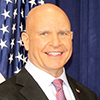
H.R. McMaster is the Fouad and Michelle Ajami Senior Fellow at the Hoover Institution, Stanford University. He is also the Bernard and Susan Liautaud Fellow at the Freeman Spogli Institute and lecturer at Stanford University’s Graduate School of Business. He was the 25th assistant to the president for National Security Affairs. Upon graduation from the United States Military Academy in 1984, McMaster served as a commissioned officer in the United States Army for thirty-four years before retiring as a Lieutenant General in June 2018.







